Impfondo, where my wife and I are working at the Pioneer Christian Hospital, is ever so slightly above the equator. This means there is consistently 12 hrs of daylight, rising and setting around 6 am/pm. They have a rainy and dry season, and currently it is the dry season. This means an average high of 33oC, and with humidity it feels more like 40oC!
So we wake up with the sun around 6am, turn on our propane stove to boil some hot water for coffee and porridge. The stove is only for us, the cooks that make us our lunch everyday use an outdoor kitchen and cook over a fire or charcoal. A sign above our stove reads, “Please conserve propane because when you run out we may not be able to get more.” We take this verrrrry seriously; no stove means no coffee! They only have instant coffee here, but being the addicts we are, we brought 3 bags of coffee for ourselves (plus one more that I surprised Steph with)! It usually gets down to around 20oC at night.
Chapel is at 7 am every morning for the staff of the hospital. It is often in French or Lingala, and our translator comes most days and helps interpret for us. There is usually a rousing song with lots of clapping and someone gets up to play the super tall drum at the front. Otherwise, it is all a capella. Next is a slow journey to the staff room, this is caused by the heat. People are rarely in a hurry to get anywhere! There we get morning report and the other doctor or I do some teaching. The room gets stiflingly hot by the end, and more than a few people have fallen asleep.
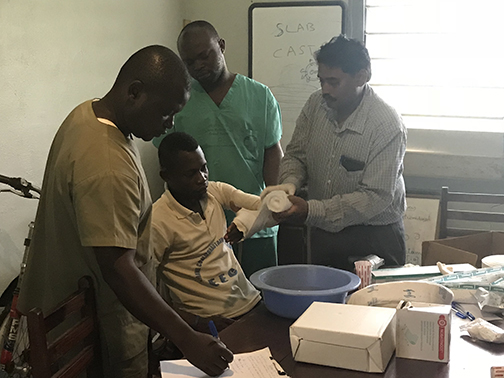
The hospital has about 30-40 staff, 60 patient beds, and is arranged as a group of 12 buildings connected by sidewalks. We walk in the hot sun to see any patients in E.R., a small building with 6 beds packed closely together. It rarely has more than 1-2 patients in it. We pass by the nursing consultation office, who sees and initiates treatment for patients without any physicians orders, usually based on protocols put in place by Dr. Harvey (the visionary, manager, chief medical officer). It is not uncommon to see a kid having a seizure, and a nurse casually walking around going through the usual treatments (cerebral malaria is very common here). They don’t usually even consult us for these cases!
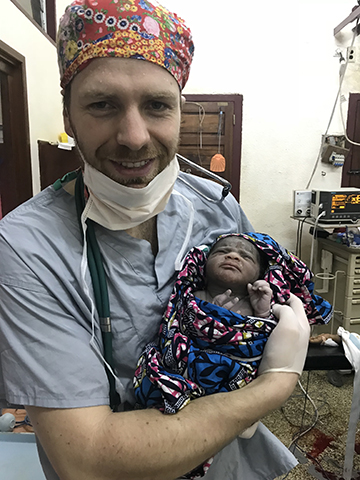
We move on next to maternity, which frequently houses very complicated or premature infants. Next is the medical wards, a small building each for men, women and pediatrics. Each have about 7 beds. They have 2 isolation rooms in each as well. As I walk in I say “ Mbote nobino!” (hello all), and almost always get quite an enthusiastic and surprised response back! The nurse tells all the family members to leave. Family is always around because they have make meals for them at the communal shelters, wash their clothes and buy their medicines. We work through each patient, and I review the chart that is a grand total of 3 pages! I think of our bloated charts back in Canada which have 50-100 pages, and at times I would wager up to 500 for the long stays. There is something to the efficiency!
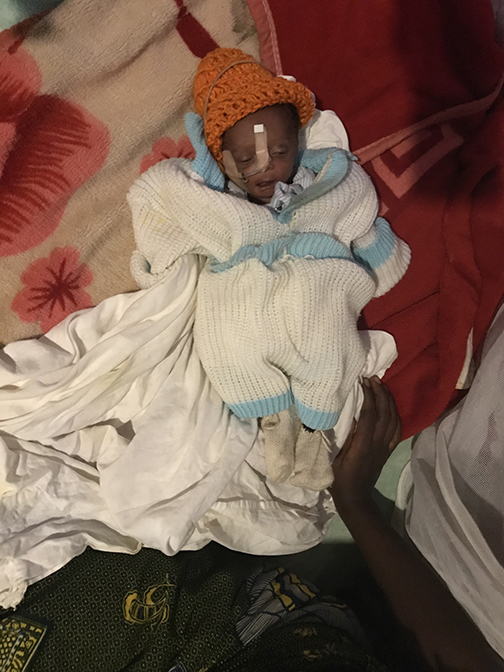
The surgical wards (a building each for men, women and wound care) are much of the same. There is a lot of leprosy left in the Congo, and people that don’t seek treatment immediately end up with a lot of sores and amputations. There are always 4 or 5 patients with leprosy here. A diagnosis I would never see in Canada. If there is a visiting surgeon this ward can be more full, but still not as full as you would expect considering the need. The difficulty is with the payment. Surgeries are prohibitively expensive for most even though they are only around $100 USD.
Our rounds finished, we may have time to see some patients in clinic prior to lunch. This requires a translator because a lot of patients won’t speak or understand French well enough, and the more common language is Lingala. For clinic, there isn’t even an attempt at a daily schedule or appointments. People arrive whenever, and then wait to see a doctor in order of arrival. Their medical charts are little notebooks that they carry with them any time they need to be seen! They then place these in order of arrival in a little hanger near my door. People come in with anything and everything. I recently saw a man who had been shot a month ago in a hunting accident and had shrapnel still imbedded in his face and brain! We had two head x-rays to confirm and that was all!
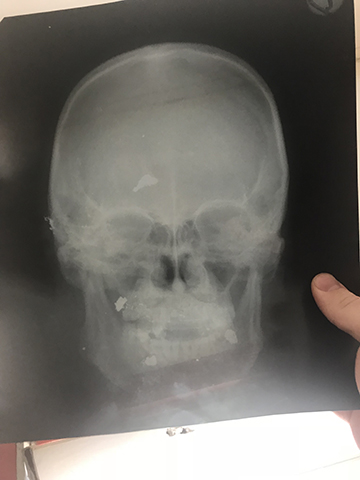
Lunch is served around noon, and is prepared by local Congolese women for us. They have been taught to cook foods that blend their traditional foods with food palatable for us. Compared to the average Congolese meal, we get different meat (they eat a lot of goat) and more vegetables. Some ingredients for our meals would be very costly for them, but again, very cheap for us. They do all the cooking and cleaning for this meal, which is very much appreciated because it takes them about 4 hours to do all of this! We simply wouldn’t have any time to make our own, plus, it is a means of supporting local workers.
I go back to clinic after this, and right now do not see many patients. They tell me that when a new doctor arrives, the people don’t come in as often because they don’t trust them yet! Clinical decision making is very, very difficult here. I have to ask what a person can afford and unless they are rich, only order the minimum of our basic tests. It is also quite difficult because we have a total of 32 different lab tests. I recall searching for a particular blood test in a hospital in Canada one day, and searching through hundreds of possible tests. To make it worse, we are running out of HIV tests and so they are only ordered for mothers and the very sick!
My day finishes whenever patients stop arriving or by 3:30pm, usually earlier. The heat is often thick at this point and I retreat to the house to rest and drink a whole lot of water. Any time patients come in or they need me they can call me or knock at my door (located within the hospital walls). Steph and I make supper or heat up leftovers, and then relax. We play games, read, go for a bike ride, go to the market or watch some of the movies or TV shows we downloaded before we came!
So that is a typical day for me here! These are usually interspersed with little trips to local villages as well!
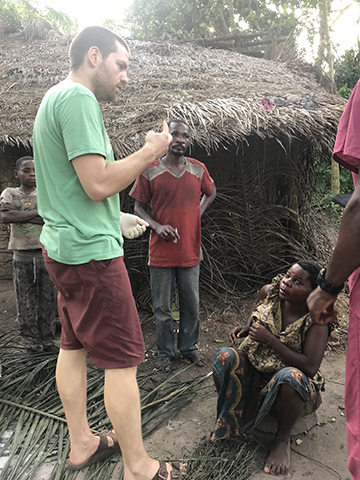
So proudof you two! I love the x-ray and 32 lab tests! Wow. Van yoy bring back oocs of the lab and x-ray?Oh I would love to go with your mom!Sheila
Sent from my Samsung Galaxy smartphone.
LikeLike
beautiful projection of your stay doctor.
LikeLike
God be with you, your provision of strength and courage and wisdom.
LikeLike